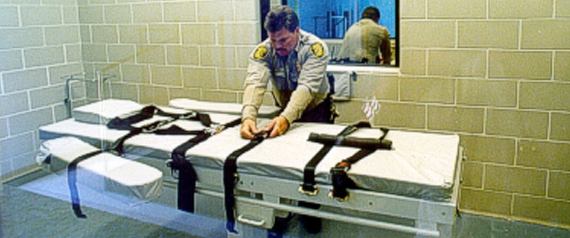Credit the State of Utah for bringing back the firing squad.
Two months ago, the state made the rifleman its method of killing when lethal drugs aren't available. Health professionals and drug companies are saying "no" to participation in executions, and this spring, the trade association representing America's pharmacists said it would "discourage" them from purveying their own lethal drug mixes on death row.
So-called "compounding pharmacies" became death-row suppliers of last resort after Big Pharma got out of the execution business. Not anymore, unless some pharmacists go rogue by defying their trade body. Executioners around the country are now scrambling to secure drugs that kill, and they're experimenting with unproven alternatives to the classic, three-drug fatal sequence.
Death by chemistry emerged almost 40 years ago as a response to our contradictory expectations of capital punishment. As crime rates soared in the late seventies and early eighties, so did our retributive ire. America re-embraced the death penalty, ending a ten-year moratorium, when a Utah firing squad shot Gary Gilmore in January 1977.
But we wanted to make the killing "humane." Less than four months later, Oklahoma enacted the first lethal injection law, based on a protocol developed by a doctor. In the 1980s, as executions again became commonplace, the Oklahoma protocol became the prevailing method.
Medical associations took stands against their members' participation, but states readily found health professionals willing to flout Hippocratic prohibitions. Some corrections departments kept doctors' names secret, paid them in cash, and otherwise hid their involvement. State-sanctioned medical killing on the down-low thus became routine.
Then, several years ago, Big Pharma began to say "no." Under pressure from activists and governments in Europe, which deems capital punishment a human-rights abuse akin to torture, drug firms stopped supplying the sedatives that begin the standard three-drug lethal injection process. In 2011, the European Commission revised its so-called Torture Goods Regulation to stop the sale of drugs, even indirectly, to America's death rows.
Some determined executioners have resorted to lawlessness. Nebraska obtained the sedative sodium thiopental from a Swiss firm via a middleman in India who told the company the medication was bound for Zambia. Federal agents have confiscated several states' supplies of illegally-obtained execution drugs. And some states have changed their killing protocols without legislative approval, moving to just one or two drugs and/or substituting sedatives in the benzodiazepine family (easier to obtain) for nearly-impossible-to-find barbiturates.
This substitution is now before the Supreme Court. In Glossip v. Gross, argued last month, three men condemned to die in Oklahoma claimed that state's swapping-in of midazolam (a benzodiazepine) for the traditional barbiturate puts them at risk of agonal suffering, in violation of the Constitution. Lawyers fenced over the physiology of unconsciousness, Justice Samuel Alito blamed "guerilla war against the death penalty" for creating the situation, and an exasperated Chief Justice John Roberts told the condemned men's lawyers, "you put us in a position of arguing that [they] can't be executed."
The "guerilla war" against lethal injection may succeed. If the Oklahoma inmates prevail - and if compounding pharmacies follow their trade association's urgings not to sell their wares on death row - a de-facto moratorium on medicalized killing will ensue.
Human-subjects research into biomedical killing methods (think Dr. Mengele) isn't an option, so expect this moratorium to last. America's almost-40-year venture in trying to have it both ways, by delivering deadly retribution while seeming to keep it, quite literally, "clinical," may be at its end.
The cleanliness of capital punishment as a "medical" procedure was always mythic, as the writhing, gasping victims of botched lethal injections ought to have taught us. Its surreptitiousness, moreover - anonymous doctors paid in cash, drugs smuggled from overseas, and secret pharmacist-suppliers - eroded capital punishment's core claim to legitimacy: the distinction between sober, state-sanctioned retribution and lawless vengeance.
The firing squad, by contrast, is authentic. It's fierce. It makes no pretense of hiding the killing. It forces sentencing jurors - and voters - to confront the violence that inheres in willfully extinguishing human life.
Some won't flinch, and there's a case to be made for their not doing so. Retribution affirms people's sense of dignity by showing that terrible acts have fearsome consequences. And we're hard-wired to want to deal out such consequences, even when they're costly to us. But fear and chaos follow when the state loses control of resulting cycles of private violence. Capital punishment is a steam vent - assurance that Leviathan is up to the task of channeling vengeful outrage in orderly fashion.
Polls show support for the death penalty is ebbing; this likely reflects America's long-term decline in violent crime and thus, falling levels of outrage. Capital punishment's demise in Europe is probably tied to the continent's much lower incidence of criminal violence. Our better angels wince at its ferocity and finality. They call upon us to reflect on our common, flawed humanity - and to refrain from irreversible Judgment that our great faiths reserve for God.
Our politics will decide whether and to what degree we retain state killing as a steam vent. We distort this politics by making the killing clinical. Medicalizing the state's ferocity hides it. That's how, a decade ago, Bush Administration lawyers rationalized torture - attended by doctors at black sites who ensured that waterboarding and "walling" were "medically appropriate" (and thus weren't really torture).
The rifleman mustering for a firing squad is honest - an icon of retribution without pretense. If we can own his violent act on our behalf, capital punishment suits us. But clinical killing is euphemism - a cowardly way for us to deceive ourselves.
I write regularly on subjects at the interface between law, culture, politics and your health. Follow me on Twitter: @greggbloche
This post originally appeared at ACSblog.
